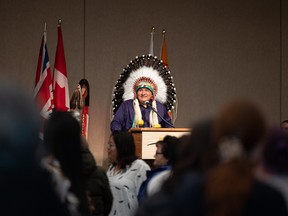FSIN chief Bobby Cameron is running for office again, despite argument of a criminal record making him ineligible to hold office.

Article content
It’s campaign season and the Federation of Sovereign Indigenous Nations is also conducting its election for the chief and executive members.
FSIN voting day is Thursday at the annual General Assembly in Saskatoon. Three-year terms are up for grabs for the chief, first vice-chief and third vice-chief. The current chief, Bobby Cameron, and third vice-chief Aly Bear are running for chief, and that is where the controversy exists.
Advertisement 2
Article content
Robert Merasty, who ran for chief in the last election, has submitted a letter through his lawyer, Grant Sharfstein, that questions Cameron’s right to run because of his criminal record.
Cameron was convicted of break, enter and theft on March 31, 1993, as originally reported by Jason Warick, a CBC reporter, on Sept. 27, 2023.
Cameron remained in office and is running again for the federation’s top job.
The FSIN election act states, “A person shall be ineligible as a candidate for an executive position if he/she has been convicted of fraud, theft or a breach of trust.”
The letter states, “It is absolutely clear from the act that Cameron is an ineligible candidate for chief and must be removed from the 2024 candidate list.”
The letter further states that Cameron may also be ineligible based on another section of the act, which requires that “he/she has failed to disclose outstanding criminal charges as sworn in Form 7 Declaration of qualification regulations …”
When Cameron announced his candidacy on Sept. 20, he was asked by a reporter if he was eligible to run. Cameron replied that one subsection stated that the individual had to be convicted of a criminal offence under the Criminal Code of Canada within a five-year period preceding the date of the election.
Article content
Advertisement 3
Article content
The subsection is unclear about what criminal charges are included in the five-year amnesty, but another subsection is clear that conviction for theft makes the individual ineligible to run for office.
Also, the declaration of qualification is clear that the candidate must make an oath that he has never been convicted of fraud. The form must be signed and sworn before a commissioner of oaths. Cameron has signed this form each time he ran for office with the FSIN.
The FSIN election act was passed by the chiefs’ assembly in 1992 and has served the organization for more than 30 years. The chiefs were adamant that their representatives be honest and have a clean record if they are to lead an organization that handles millions of dollars annually.
It is important that this be addressed before the election. The chiefs must follow the rule of law. The election act was created by the chiefs in assembly and if its application has been compromised, the chiefs must address it.
An investigation must also be undertaken to determine how the credentials committee was able to pass over the mandatory criminal record check and allow Cameron to run in previous elections.
Advertisement 4
Article content
This is much more serious than the candidacy of one individual. It places the entire organization in jeopardy. To ignore the rule of law casts a dark shadow across the FSIN as the legitimate voice of the First Nations of Saskatchewan.
In the letter, Merasty requested that the FSIN provide a copy of Cameron’s form 7, which he was required to submit for the upcoming election. This request has no legal weight. According to Merasty, there has been no reply from the organization.
The credentials committee has the ability — and in this case, the duty — to have the candidate in question respond to the concerns raised in this letter.
This is not an issue the FSIN can ignore. It affects the organization’s credibility and contradicts any demands for self-government and First Nations legislation. It places the organization in the position of a banana republic where the rule of law does not apply to everyone.
After all, we are in the midst of an election; Aly Bear might well be elected the next chief of the organization. But whatever the outcome, the FSIN needs to review its policies and legislation to prevent future breaches of the election act.
Doug Cuthand is the Indigenous affairs columnist for the Saskatoon StarPhoenix and the Regina Leader-Post. He is a member of the Little Pine First Nation.
Recommended from Editorial
Our websites are your destination for up-to-the-minute Saskatchewan news, so make sure to bookmark thestarphoenix.com and leaderpost.com. For Regina Leader-Post newsletters click here; for Saskatoon StarPhoenix newsletters click here
Article content







